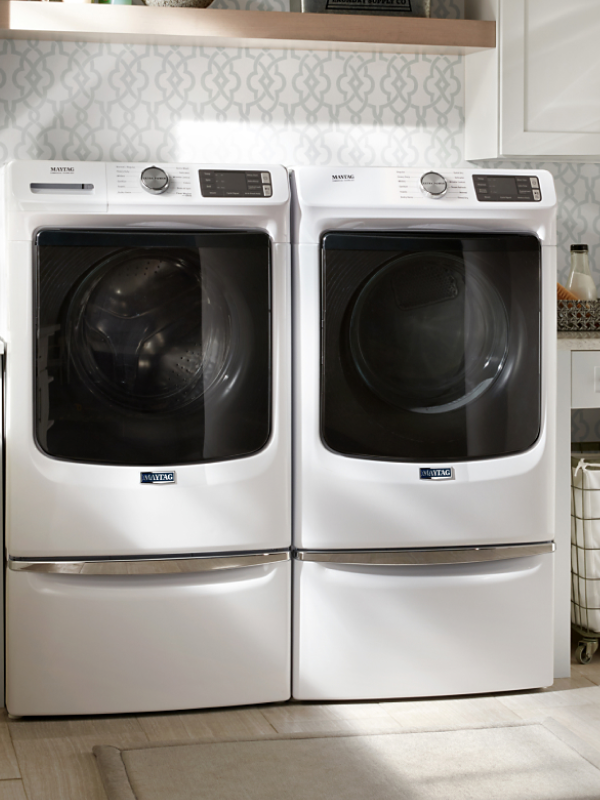さまざまなドライヤーの選択肢にまったく困惑しているお気に入りのアプライアンスストアの通路に立っていることに気付いたことがありますか? 「ガス乾燥機に行くべきですか、それとも電気ドライヤーを選ぶべきですか?」 - この質問は、あなたが認めたいよりも頻繁にあなたの心に浮かんだかもしれません。さて、あなたが二度目の推測にうんざりしていて、最終的に情報に基づいた決定をしたいなら、あなたは正しい場所にいます!
このブログでは、ガス乾燥機と電気乾燥機の比較を深く掘り下げ、2つを分離する重要な違いを解明します。しかし、私たちは長所と短所を強調するだけで止まることはありません。ここでの私たちの使命は、エネルギー消費の観点からこれらの2種類の電化製品の複雑さを理解するのを助けることです。初期コストから運用効率まで、あらゆる側面をカバーしました。
ガス乾燥機と電気乾燥機の内外を照らすので、私たちと一緒にいて、あなたに実用的な装備を装備してください。 省エネのヒント これにより、二酸化炭素排出量が減り、苦労して稼いだ現金を節約できます。より精通した、環境に配慮した消費者になる準備はできていますか?すぐに飛び込みましょう!
- ガス乾燥機の概要
- 電気乾燥機の概要
- ガス乾燥機と電気乾燥機:違いは何ですか?
- 電気乾燥機とガスドライヤーを実行するためのコスト
- EVVRエネルギー監視スマートプラグ&リレー - 従来の電気乾燥機をエネルギー効率の高いスマートドライヤーに変換します
ガス乾燥機の概要
a ガス乾燥機、名前が示すように、天然ガスまたはプロパンを主要なエネルギー源として利用する衣類乾燥機です。これは、特にガスが電気よりも比較的安価な地域では、住宅所有者の間で人気のある選択肢です。以下は、ガス乾燥機の概要で、その機能、利点、および短所について説明します。
それがどのように機能するか
ガス乾燥機は、衣服を転倒させるドラム、ガスバーナー、イグナイターで構成されています。濡れた衣服を積み、乾燥機を起動すると、イグナイターはガスバーナーに火をつけ、熱を発生させます。この熱は、ドラムに引き込まれる空気を暖めるために使用されます。ドラムが回転すると暖かい空気が衣服を乾燥させ、湿った空気が機械から排出されます。
ガス乾燥機の利点
- より速い乾燥時間: 通常、ガス乾燥機 乾燥した服をより速くします 電気乾燥機より。これは、特に洗濯が頻繁に必要な大家族にとっては、時間節約になる可能性があります。
- 費用対効果の高い操作: ガス乾燥機の前払いコストは電気のコストよりも高くなる可能性がありますが、多くの地域の電気と比較して天然ガスのコストが低いため、通常、運用がより費用対効果が高くなります。
- g服のエントラー: ガス乾燥機は衣服をより速く乾燥させるため、生地には穏やかになる傾向があります。これはあなたの服の寿命を延ばすのに役立ちます。
短所
- より高い初期コスト: ガス乾燥機は、一般に、電気乾燥機と比較して最初に購入するのにより高価です。
- インストールの制約: ガスラインと適切な通気口が必要です。あなたの家にまだガスラインが装備されていない場合、設置は非常に高価で面倒です。
- 潜在的な安全リスク: ガス器具は常にガス漏れの小さなリスクを負いますが、そうでない場合は危険な場合があります 適切に維持および監視されます。多くの子供がいる家にとって理想的な選択肢ではなく、彼らの面倒を見るのに非常に少ないかもしれません。
ガス乾燥機を考慮する必要がありますか?
天然ガスが比較的安価で、家にはすでにガスラインがある地域に住んでいる場合、ガス乾燥機は経済的で効率的な選択肢になります。特に大規模な世帯や、乾燥時間をより速く評価する人に適しています。
結論として、ガス乾燥機を検討する場合、より高い前払いコストと設置要件に対して、より速く、より経済的な乾燥の利点を比較検討することが重要です。あなた自身の洗濯のニーズとあなたの家の特定の状況を理解することは、あなたの意思決定プロセスを導くのに役立ちます。

電気乾燥機の概要
ガス乾燥機とは対照的に、電気乾燥機は、衣服を乾燥させるための唯一の電力源として電気を利用します。これは、特にガスラインを設置することが実現可能でも経済的でもない地域では、多くの世帯にとって一般的な選択です。以下は、電気ドライヤーの概要を示し、その機能、利点、および短所を強調します。
それがどのように機能するか
電気乾燥機は、衣服を転倒させるドラム、電気加熱要素、モーターで構成されています。濡れた衣服を積み込んだ乾燥機を起動すると、加熱要素が空気を加熱します。この熱い空気は、ドラムのタンブルな衣服を通って循環し、水分を蒸発させます。その後、湿った空気が機械から排出され、衣服が乾いたままになります。
電気乾燥機の利点
- 初期コストの削減: 電気乾燥機 通常、ガス乾燥機と比較して購入が安くなります。これにより、予算に配慮した消費者がアクセスしやすくなります。
- 簡単なインストール: 電気乾燥機にはのみが必要です コンセント、ガス乾燥機よりも設置を容易にし、多くの場合安価にします。多くの電気乾燥機には240ボルトのコンセントが必要であるため、まだ利用できない場合は電気技師が必要になる場合があります。
- 広く利用可能: 電気乾燥機はより一般的であり、ガス乾燥機と比較して、より広範なモデルと機能で利用できます。
電気乾燥機の短所
- 乾燥時間が長い: 電気乾燥機は通常、ガス乾燥機と比較して衣服の乾燥に時間がかかります。これは、特により大きな負荷に対して、効率が低下する可能性があることを意味します。
- より高い運用コスト: 多くの場合、電気は天然ガスよりも高価なので、電気乾燥機を操作することは時間とともによりコストがかかる可能性があります。
- より高い二酸化炭素排出量: 乾燥機で使用される電気が再生不可能なソースから生成される場合、ガス乾燥機と比較してより高い二酸化炭素排出量がある場合があります。
誰が電気乾燥機を検討すべきですか?
電気乾燥機は、ガスラインにアクセスできない人や、1つの設置が非現実的であることを発見する人に最適です。また、より低い事前コストを優先する人や、電気オプションでのみ利用可能な特定のモデルの好みを持っている人にも適しています。予算、家庭のニーズ、地元のエネルギーコストを評価することで、情報に基づいた決定を下すのに役立ちます。
ガス乾燥機と電気乾燥機:違いは何ですか?
ガスと電気乾燥機の違いを知りたい場合は、以下のテーブルはあなたが通過するべきことです。これは、複数の基準にわたってガスドライヤーと電気乾燥機を比較する非常に詳細なテーブルです。
|
基準 |
ガス乾燥機 |
電気乾燥機 |
|
エネルギー源 |
天然ガスまたはプロパン |
電気 |
|
初期コスト |
一般に、より高価な前払い |
一般的に安価な前払い |
|
運用コスト |
通常、地元のガス価格に応じて低くなります |
通常、地元の電力価格に応じて高くなります |
|
乾燥時間 |
より速い乾燥時間 |
乾燥時間が遅い |
|
インストールの複雑さ |
ガスラインと通気が必要です。より複雑で、おそらく費用がかかります |
240ボルトの電気コンセントが必要です。よりシンプルで、おそらくコストがかかりません |
|
可用性 |
利用可能なモデルが少ない |
より多くのモデルとオプションが利用可能です |
|
メンテナンス |
ガス漏れをチェックするための定期的なメンテナンスが必要です |
通常、メンテナンスが少なくなります |
|
効率 |
乾燥時間が短くなったため、効率が高くなります |
乾燥時間が遅いため、効率が低下します |
|
熱源 |
ガスバーナーは空気を加熱します |
電気加熱要素は空気を加熱します |
|
平均余命 |
より効率的な熱生成により、わずかに長い寿命 |
効率が低いため、寿命がわずかに短くなります |
|
安全性 |
ガス漏れの小さなリスク。必要 慎重な監視とメンテナンス |
ガス漏れのリスクはありません。より安全だと考えられています |
|
子供/ペットの考慮事項 |
たくさんの子供とペットがいる家には理想的ではないかもしれません |
ペットの子供たちの数が多いにもかかわらず、あまり安全の問題はありません |
|
通気要件 |
外部ベントが必要です |
外部ベントが必要です |
|
サイズと寸法 |
通常、サイズは電気乾燥機と似ています |
通常、ガス乾燥機とサイズが似ています |
|
二酸化炭素排出量 |
天然ガスが使用される場合は低くなります。プロパンが使用される場合は高くなります |
電気が再生不可能なソースから供給されている場合、より高い |
|
ファブリックケア |
乾燥時間が短くなっているため、生地で穏やかになる可能性があります |
乾燥時間が長くなるため、生地で少し厳しい場合があります |
|
場所の制約 |
ガスラインの近くに設置する必要があります |
適切な電気コンセントがある場所に設置できます |
|
再販値 |
ガスが好まれている地域の家の再販価値を高める可能性があります |
家の再販価値にそれほど影響しない可能性があります |
|
ローカル規制 |
一部の地域では、ガス器具の設置に制限がある場合があります |
通常、インストールの制限が少なくなります |
|
気候への影響 |
ガス調達によって異なります。潜在的に電気よりも低い |
電気の調達によって異なります。潜在的にガスよりも高い |
ガス乾燥機と電気乾燥機のいずれかを選択する場合、前払いコストだけでなく、長期的な運用コスト、設置の容易さ、個人的な好みも考慮することが不可欠です。さらに、環境への懸念と同様に、地元のエネルギー価格と可用性も、意思決定プロセスにおいて役割を果たす必要があります。

電気乾燥機とガスドライヤーを実行するためのコスト
電気乾燥機とガス乾燥機を走らせるコストは、電気と天然ガスの現地コスト、乾燥機モデルの効率、乾燥の周波数とサイズなど、いくつかの要因に基づいて異なります。コストを分解しましょう:
電気とガス乾燥機のコストの故障表
|
カテゴリ |
電気乾燥機 |
ガス乾燥機 |
|
初期コスト |
より低い |
より高い |
|
運用コスト |
年間130ドル |
年間85ドル |
|
乾燥時間 |
長い |
短い |
|
熱 |
より低い |
より高い |
|
コスト削減 |
- 年間40ドル |
年間40ドル |
|
回収期間 |
n/a |
1〜2。5年(使用法に応じて) |
|
おすすめ |
新しいインストールにはお勧めしませんが、切り替えに費用がかかります |
新しいインストールに推奨されますが、費用対効果が高くなります |
|
インストールコスト |
n/a |
250〜1,000ドル(新しいガスラインの場合) |
重要なテイクアウト:
- ガス乾燥機は、電気乾燥機と比較して、前払いコストが高くなっています。
- ガス乾燥機は熱くなり、乾燥時間が短く、エネルギー消費量が減り、コストの節約が削減されます。
- 平均して、電気ドライヤーの操作には年間約130ドルかかりますが、ガスドライヤーは年間約85ドルです。
- 電気乾燥機でガス乾燥機を使用するためのコスト削減は、年間約40ドルです。
- より高い前払いコストを考慮して、ガス乾燥機の回収期間は、使用法に応じて1〜2。5年の範囲です。
- 新しい家を建てるときは、コスト効率のためにランドリールームにガスラインを運営することをお勧めします。
- 既存の電気ラインからガスに切り替えることは、250ドルから1,000ドルの範囲である新しいガスラインを実行するための追加費用のため、費用対効果が高い場合があります。
- 最後に、より効率的なガスまたは電気乾燥機とは何ですか?明らかに、ガス乾燥機。
これらのコストは近似であり、次のようなさまざまな要因に基づいて異なる場合があります。
- 地元のエネルギーコスト: 天然ガスと電気の価格は、あなたの場所によって大きく異なります。
- 乾燥機の効率: エネルギー星定格およびその他の高効率モデルは、より少ないエネルギーを使用する場合があります。
- 負荷サイズと頻度: より少ない負荷または荷重が少ないと、より少ないエネルギーが少なくなります。
- 乾燥習慣: センサーの乾燥などの機能を使用すると、時限乾燥と比較してエネルギー使用を減らすことができます。
EVVRエネルギー監視スマートプラグ&リレー - 従来の電気乾燥機をエネルギー効率の高いスマートドライヤーに変換します
電動ドライヤーをにアップグレードします EVVRエネルギー監視スマートプラグ&リレー よりスマートでエネルギー効率の高いランドリーエクスペリエンスのために。この革新的なデバイスはいくつかの利点を提供します:
エネルギー消費監視: 電動ドライヤーの電力使用量をリアルタイムで追跡し、二酸化炭素排出量と電気料金の両方を削減するための情報に基づいた決定を可能にします。
安全設計: EVVRエネルギー監視スマートプラグ&リレー 安全性に優先順位を付け、電化製品と家が電気事故から保護されていることを確認してください。
リモートコントロールと追加の自律スケジューリング:あなたの電気ドライヤーをどこにでもオンまたはオフにしてください EVVRアプリ。安価な電力時間中または最適な操作に最適な操作のスケジュールを作成できます。
便利なプラグアンドプレイ接続: EVVRスマートプラグ&リレー 使いやすいです - それを差し引くことができ、電気乾燥機を接続し、すぐに使用し始めます。すべてのユーザーに適した複雑なセットアップは必要ありません。
EVVRエネルギー監視スマートプラグ&リレーは、従来の電気乾燥機をスマートでエネルギー効率の高いアプライアンスに変換します。この不可欠なスマートプラグを家に装備することで、より環境に優しい、より賢く、費用効率の高い未来の可能性を最大化できます。
私たちのテイク
初期コストとエネルギー効率から設置要件や営業費用まで、情報に基づいた決定を下すために必要な情報を武装させるよう努めました。最終的に、ガス乾燥機と電気乾燥機の選択は、家庭のニーズ、予算、および価値に合わせる必要があります。私たちの観察から、ガス接続と適切な安全性がある場合は、ガス乾燥機に行くことをお勧めします。より速い乾燥時間、運用コストの削減、設置の容易さ、またはスマートホームシステムとの統合を優先するかどうかにかかわらず、違いを理解することが重要です。ガスに行くべきか電気乾燥機に行くべきかについてさらに知りたい場合は、メッセージを残してください。











